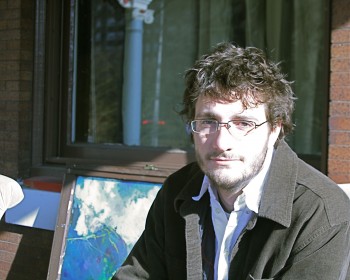Filming Community History

Corey Chao' 08 now works as the Community Programs Coordinator at Scribe Video Center.
Details
In March, Scribe Video Center [http://scribe.org/] hosted the world premiere of its Precious Places documentary series, which supports Philadelphia area neighborhood groups in documenting local history. In attendance and in the spotlight at the event were Corey Chao (Haverford Anthropology '08), Community Programs Coordinator at Scribe, and Associate Professor of Anthropology Maris Gillette, a facilitator for one of the ten projects.
Scribe director Louis Massiah, who has taught documentary filmmaking at Haverford, began the evening by highlighting the essential role played by Chao in making Precious Places happen this year. Lillian Friedman, one of the key participants in Neighbors and Nature In Harmony, the documentary Gillette worked on, ended the night by lauding Gillette as the“best facilitator” of Precious Places 2009.
Chao brought to the work of managing Precious Places, which was first launched in 2005, extensive experience in community media. He has taught photography to African and Middle-Eastern refugees in Istanbul, founded a student media club in Philadelphia; and interned at Appalshop Media Center in Whitesburg, Kentucky. New for Chao with Precious Places, though, was the scale of the production timeline, the breadth of the projects, and the major responsibility he shouldered in supporting the groups through eight months of work.
His work as Community Programs Coordinator, says Chao,“gave me quite a respect for process in community media, rather than simply the end product. A lot of groups gain something very important by collaborating in the works' creation. Groups are forced to articulate so many things about themselves through the course of production. In the end, the groups have changed, as have the meanings of their Precious Places.”
Working with the residents of Northeast Philadelphia's Longford Street on Neighbors and Nature in Harmony, which looks at the experience of living in Philadelphia's first racially integrated housing development, was Gillette's first venture into collaborative anthropology and community media. An experienced ethnographer with two long-term field projects in China, Gillette was accustomed to gathering oral histories and observational data, and using archives and libraries. Working on a team project was less familiar. “Scholars in the humanities and social sciences rarely have opportunities for deep collaborations,” says Gillette.“Mostly we work alone. But Neighbors and Nature in Harmony was a collective effort at every stage, from filming to script-writing to transcribing to editing. Developing a collaborative representation of the neighborhood's past and present meant working our way through disparate views about the street and its inhabitants and what the film should contain.”
With the 2009 premiere behind him, Chao is organizing one final year of community documentaries for Scribe. Calls for new proposals are out, and he is soliciting applications from neighborhoods across Philadelphia as well as in Camden, New Jersey. Chao is also looking for humanities scholars and social scientists from the fields of history, urban studies, anthropology, folklore and sociology to work as facilitators. These scholars help guide the groups' research, discuss the process of creating oral histories, and help identify sources of archival images and other materials. They can also participate in the filmmaking process, as Gillette did with Neighbors and Nature in Harmony.
“Scribe and Precious Places have been very affirming for my documentary spirit,” says Chao, who sees community media as an important outlet for anthropologists, given the discipline's concern with the politics of representation. “Collaborative representation is going to dominate the practice of anthropology in the future as we open our ears to those stakeholders who are perfectly capable of interpreting their situations through the same theorists we've quoted,” he notes.
Gillette says she concluded the project“deeply impressed by the residents' commitment, by the amount of time and energy they were willing to devote to producing a community history, and by the political significance of this type of work.”
Not only is Scribe giving ordinary people a chance to be part of the public record, observes Gillettte, the Precious Places documentaries show that the value of a place isn't necessarily reflected in the market price particular properties can command.“In the case of Longford Street,” Gillette says,“the sincere and courageous efforts that residents are making to break down housing segregation and racial prejudice are worth far more.”
Faculty interested in working with Scribe on the next round of Precious Places should contact Chao by email at corey [at] scribe.org or by telephone at 215-222-4201.



